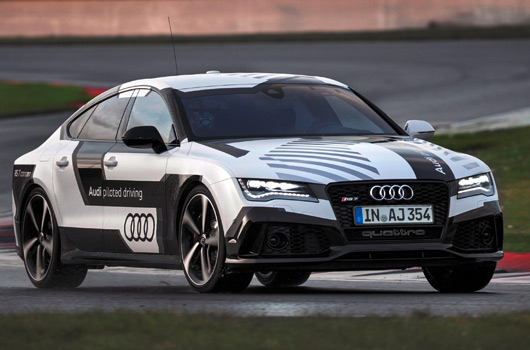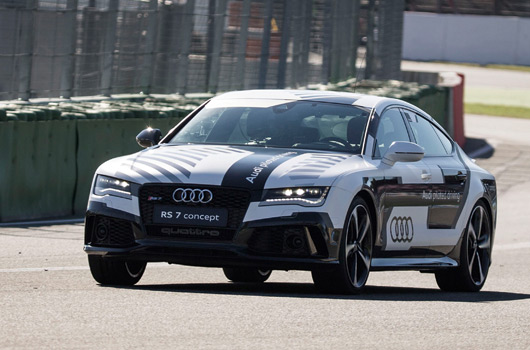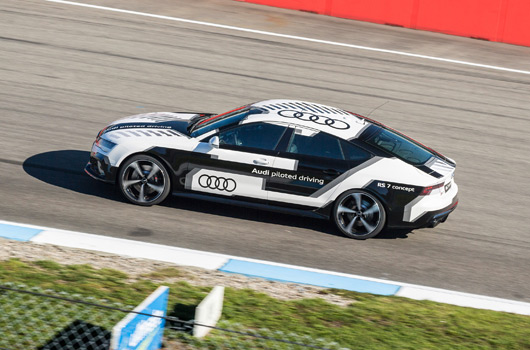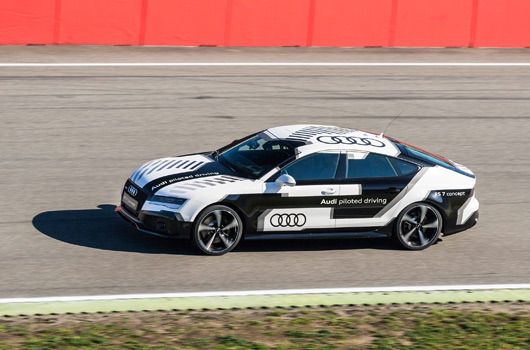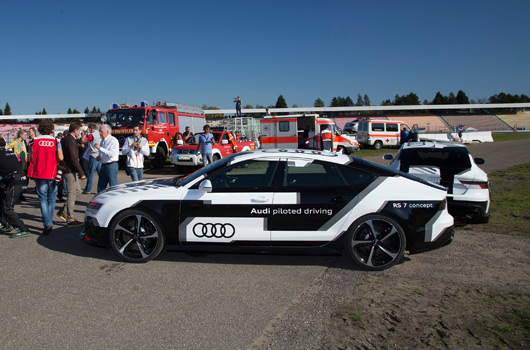Audi has been leading the way in the world of driverless technology and that was further highlighted in a live demonstration during the season-ending DTM round at Hockenheim on the weekend.
With the strangely named Audi piloted driving technology onboard, making it sound like the car has a pilot at the wheel, a driverless RS7 lapped the famed German grand prix track in just over two minutes, reaching a maximum speed of 240km/h. Apparently that’s a world record top speed for a driverless car.
The specially prepared RS7 used a combination of GPS, WiFi, high-frequency radio and 3D cameras to guide itself around the circuit. As you’ll see in the highlights video below the accuracy of the car’s cornering lines is very good and so too the positioning of the car in the pole position grid spot at the end of its lap.
If you think the end is nigh and we’ll all one day have the joys of driving taken away from us, Audi has this to say:
It might sound futuristic, but it’s already at the starting gates. For Audi, piloted driving is one of the top drivers of innovation in the coming years and is a logical, evolutionary step in the development of the car. It’s an evolution that has the potential to revolutionise the experience of driving a car. And one thing is certain: If it is up to Audi’s engineers, the feeling of freedom and the fun of sporty driving will be maintained – because there is a choice. Piloted driving is not a “mustâ€, but rather something you “can†select. Audi will never build robot cars, but instead will always put the driver in the focus of its decisions.
Proof positive: Audi RS 7 concept taken to the limit with no driver
- Audi sets new standards for piloted driving
- Audi RS 7 piloted driving concept completes Hockenheimring lap driverless at racing speed
- Prof. Dr. Ulrich Hackenberg, AUDI AG Board Member for Technical Development: “This top performance substantiates the skills of our development team with regard to piloted driving at Audi.â€
At the DTM season finale, Audi demonstrated the sheer fascination of piloted driving. The Audi RS 7 piloted driving concept completed a lap on the Grand Prix track in Hockenheim – at racing speed, without a driver.
Audi scored yet another major success in the development of piloted driving: Before the season finale of the Deutsche Tourenwagen Masters (DTM), the latest technology pioneer was running up to its physical limit, with no driver. It took the Audi RS 7 piloted driving concept just slightly over two minutes to complete a lap on the Grand Prix track in Hockenheim – piloted with high precision and accuracy to within centimeters.
“The top performance by the Audi RS 7 today substantiates the skills of our development team with regard to piloted driving at Audi,†said Prof. Dr. Ulrich Hackenberg, Board Member for Technical Development at AUDI AG. “The derivations from series production, particularly in terms of precision and performance, are of great value for our further development steps.â€
For orientation on the track, the technology pioneer uses specially corrected GPS signals. This GPS data is transmitted to the vehicle via WiFi according to the automotive standard and redundantly via high-frequency radio. In parallel to this, 3D cameras in the car film the track, and a computer program compares the cameras’ image information against a data set stored on board. This is what makes it possible for the technology pioneer to orient itself on the track within centimeters.
Piloted driving is one of the most important development fields at Audi: The first successful developments were achieved ten years ago. The test results continually flow into series development. The latest test runs at the physical limit are providing the Audi engineers with insights for the development of automatic avoidance functions in critical driving situations, for example.
Driver assistance systems from Audi are already making driving more relaxed and better controlled. These systems’ highest level of development can be experienced in the updated Audi A6* and Audi A7 Sportback* model series. The offerings include Audi side assist, Audi active lane assist, and adaptive cruise control with Stop&Go function including Audi pre sense front.
Experts from Volkswagen Group Research, the Electronics Research Laboratory (ERL) and Stanford University (both in California) are supporting Audi as partners in the further development of piloted systems.
Fuel consumption of the models named above:
Audi A6:
Combined fuel consumption in l/100 km: 9.6 – 4.2 (24.5 – 56.0 US mpg)**;
Combined CO2 emissions in g/km: 224 – 109 (360.5 – 175.4 g/mi)**
Audi A7 Sportback:
Combined fuel consumption in l/100 km: 9.5 – 4.7 (24.8 – 50.0 US mpg)**;
Combined CO2 emissions in g/km: 221 – 122 (355.7 – 196.3 g/mi)**
**The fuel consumption and the CO2 emissions of a vehicle vary due to the choice of wheels and tires. They not only depend on the efficient utilization of the fuel by the vehicle, but are also influenced by driving behavior and other non-technical factors.
